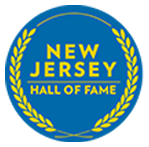Larry Doby
Baseball player and manager
Born: December 13, 1923, in Camden, South Carolina
Died: June 18, 2003, in Montclair, New Jersey
New Jersey Hall of Fame, Class of 2010: Sports
Larry Doby’s road was a tough one. As the first African American player in baseball’s American League, Doby faced the same taunts and bigotry as Jackie Robinson, who had broken baseball’s color barrier in the National League just 11 weeks before Doby’s debut. Doby didn’t get the credit or attention heaped on Robinson, but he did as much as Robinson to integrate baseball–and went on to a Hall of Fame career.
Born in South Carolina, Doby was the son of a World War I veteran who worked as a horse groomer and played semi-pro baseball. Doby was raised mainly by family relations. His parents divorced when he was young and his father died in an accident. At 14, he moved to Paterson to reunite with his mother. He blossomed as an athlete at Paterson Eastside High School, starring in baseball, basketball, football, and track.
After high school, Doby accepted a basketball scholarship to attend Long Island University. Around the same time, he received an offer to play baseball for the Newark Eagles of the Negro National League. That ended his college career before it began. Doby’s nascent professional career was interrupted by two years in the Navy during World War II. Following his service in the Pacific, Doby returned to the Eagles for the 1946 season, helping lead the team to the Negro World Series championship.
Bill Veeck, the innovative owner of the Cleveland Indians, had wanted to integrate baseball for several years, but was rejected by league management. Once Robinson broke the color barrier with the Brooklyn Dodgers, Veeck purchased Doby’s contract from the Eagles, and on July 5, 1947, Doby made his debut as a pinch-hitter for the Indians, becoming the second African American to play in Major League baseball.
Not all of Doby’s teammates were accepting of the tall, lean rookie, who came to the club with a reputation for speed and power. Like Robinson, he received death threats, was taunted on the field by opposing players, and had to eat and sleep in separate accommodations from the rest of the team. And, like Robinson, Doby maintained his composure. After a slow start in 1947, he became one of the league’s best players, helping lead the Indians to a World Series victory in 1948 over the Boston Braves. During the series, Doby hit the first post-season home run by an African American.
During his nine years with the Indians, Doby, a lefty-hitting outfielder, led the American League in home runs twice and drove in more than 100 runs four times, leading the league with 126 RBIs in 1954. He batted over .300 twice, including a career-high .326 in 1950. He was an All-Star seven-consecutive years from 1949-1955 and finished second in the MVP voting in 1954, when the Indians went to the World Series again, but lost to the New York Giants.
Doby played for six more MLB seasons with the Chicago White Sox, Detroit Tigers, and the Indians again, knocking in 102 runs for the White Sox in 1956. He retired after the 1959 season with an MLB total of 253 lifetime home runs and a career batting average of .283. He stayed in baseball as a scout and coach and in 1978 became the second African American to manage in the Majors. Again, it was Veeck who hired Doby, this time for the Chicago White Sox.
After retiring from baseball, Doby, who had settled with his family in Montclair, served as director of communications with the NBA’s New Jersey Nets and as the team’s director of community relations. In 1995, he returned to baseball as a special assistant to the president of the American League.
At Doby’s posthumous induction into the New Jersey Hall of Fame, fellow baseball great Bill White described his old friend as “a beautiful, talented, intelligent human being, and a great family man.” Indeed, as a player, in the face of unimaginable obstacles, he had won the respect of peers and fans alike. Remarkably, despite his achievements as a player and pioneer, Doby was not elected to the Baseball Hall of Fame until 1998, 20 years after leaving the game. It was one more reminder of the woe of being No. 2.
